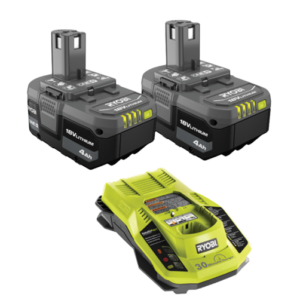Introduction
Power tool users often look for interchangeable batteries to save money and simplify their collection of power tools.
For being the two most popular brands of power tools it’s quite normal to wonder, are Hart and Ryobi batteries interchangeable?
No, Hart and Ryobi Batteries are not interchangeable. Both of these batteries are designed to work for their respective brand tools only. These brands’ batteries are not interchangeable because of the different battery voltages, design differences, and battery slot compatibility.
Safety and warranty are also prominent reasons behind this non-interchangeability as well. Want to find out more about these brands’ interchangeability? Then let’s move on to more details.
Are Hart and Ryobi Batteries Interchangeable?
Hart and Ryobi batteries are not interchangeable, as they are designed to work specifically with their respective tools and charging systems. While they may appear similar in size and shape, the electrical specifications of the batteries can vary.
Moreover, battery packs and chargers are explicitly built for the manufacturers’ own line of products. So, attempting to use a battery from one brand in a tool from another brand could result in damage to both the battery and the tool.
 Source: Ryobi Tools
Source: Ryobi Tools
For example, Ryobi batteries will be great for their own power tools like Ryobi P290 and P237. But using them on any Hart tools can be damaging.
Why are Power Tools Batteries Not Interchangeable?
Now that you know that batteries are not interchangeable, it’s quite normal to be curious about why they are not interchangeable. Let’s take a look at the reasons down below.
Battery Slots Compatibility
Battery slot compatibility is one of the most prominent factors that affect battery interchangeability, particularly in cordless power tools that use battery packs. Battery slots refer to the physical compartment in the tool where the battery is inserted and connected to the tool’s electrical system.
Different electronic devices have specific battery slots or compartments that are designed to accommodate a particular type and size of the battery. This is usually done to prevent the use of non-OEM batteries.
 Source: Pro Tool Review
Source: Pro Tool Review
They do this by incorporating specific locking mechanisms or other proprietary features. This is done to protect their brand, maintain control over their battery platform, and ensure safety and performance.
In addition to size, battery slot compatibility also includes factors such as polarity and connection type. Different brand batteries have different polarity configurations, where the positive and negative terminals are located in different positions.
If a battery with the wrong polarity is inserted into a device, it can cause damage to the device or the battery.
Different Battery Voltage
Different battery voltages can greatly affect battery interchangeability as well. Voltage is a measure of the electrical potential difference between two points. It determines how much electrical energy the battery can provide.
If the electrical characteristics of a battery are not compatible with a tool’s electrical system, using the battery could damage the tool and the battery.
Moreover, if the voltage of a battery is too high or too low for the tool or device it is intended for, it may not be compatible.
For example, if a tool is designed for use with an 18V battery, using a 20V battery could damage the tool or device, or cause it to malfunction.
Safety
Safety is another big reason behind batteries not being interchangeable. The use of non-OEM (original equipment manufacturer) batteries may pose a safety risk.
This is because they have not been tested and certified for use with the tool. Non-OEM batteries may be more prone to overheating or even exploding.
Warranty and Liability
The use of non-OEM batteries may void the warranty of the tool and the battery. If using a non-OEM battery results in damage to the tool, the manufacturer may not be liable for repair or replacement.
Why Don’t Manufacturers Make Interchangeable Battery Packs?
Producing solely their own brand-compatible battery-fitting tools is a decision of profitability and competitive advantage for each company. Making batteries that are only compatible with their own tools can create a steady source of revenue for the manufacturer.
Moreover, having unique batteries that are only compatible with their own tools can create brand loyalty. This is because customers may be more likely to buy tools from the same brand if they already own batteries that are compatible with those tools.
However, there are some manufacturers that do make interchangeable battery packs. These manufacturers often have agreements or partnerships with other brands to ensure compatibility.
They may design their batteries to be compatible with a standard battery platform such as the DeWalt 20V MAX battery platform. These batteries are great for DeWalt 708 and 780.
FAQs
Can 18 V Batteries Be Universally Interchangeable?
No, 18V batteries are not universally interchangeable. There are different types of 18V batteries that are not interchangeable between different brands and models of power tools. Even within the same brand, there can be different types of 18V batteries.
Are Ryobi 40V Batteries Interchangeable with Other Brands?
No, Ryobi 40V batteries are not interchangeable with other brands of batteries. This is due to differences in design and electrical specifications. Ryobi has its own battery platform and the design of its 40V batteries may not be compatible with other brands of power tools.
Is There A Lifetime Warranty For Hart Tools?
No, a lifetime warranty is not offered for HART tools. With the option to purchase an extended warranty, HART typically offers a one-year limited warranty. The product’s materials and workmanship are covered by the limited guarantee, as are manufacturing flaws.
End Words
That’s the end of our discussion on are Hart and Ryobi batteries interchangeable? Hopefully, the discussion above solved your confusion about this topic.
If any confusion arises do contact a professional mechanic or call the company’s customer care for further assistance.
Until next time!



